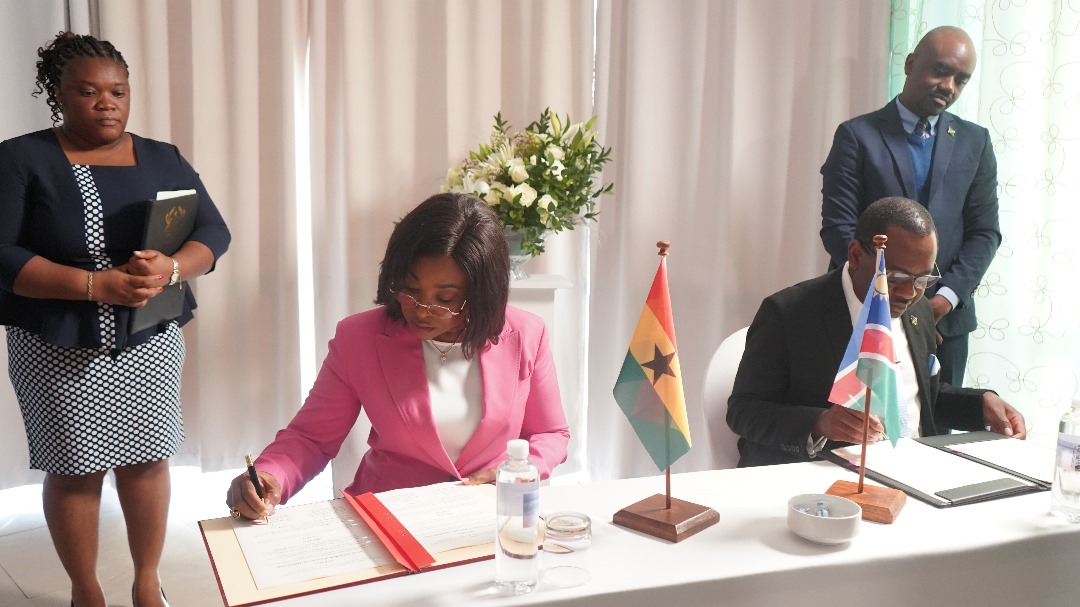Ghana
and
Namibia
will
establish
a
Bi-National
Commission
(BNC)
to
be
co-chaired
by
Heads
of
State,
elevating
the
status
of
their
30-year-old
Permanent
Joint
Commission
for
Co-operation
(PJCC),
according
to
a
communique
signed
by
their
foreign
ministers
in
Swakopmund,
a
port
city
360
km.
west
of
the
capital,
Windhoek.
“With
the
elevation
of
our
PJCC
to
a
BNC,
our
instrument
for
co-operation
will
now
be
formally
led
by
our
Heads
of
State;
they
will
give
us,
the
foreign
ministers,
our
marching
orders,”
Ms.
Shirley
A.
Botchwey,
Ghana’s
Minister
of
Foreign
Affairs
and
Regional
Integration,
said.
“It’s
a
demonstration
of
the
importance
we’re
attaching
to
our
relationship.”
Ms.
Botchwey
co-signed
the
communique
with
Dr.
Peya
Mushelenga,
Minister
of
Foreign
Affairs
and
Co-operation
of
Namibia,
at
a
joint
meeting
and
ceremony
on
Friday,
preceded
by
three
days
of
technical
work
by
Ghanaian
and
Namibian
senior
officials
and
technocrats.
The
mineral-rich
southern
African
country
of
2.6
million
people,
has
recently
made
off-shore
oil
discoveries
estimated
to
be
more
than
20
billion
barrels,
making
it,
potentially,
the
third
largest
oil-rich
country
in
Africa
after
Libya
and
Nigeria,
and
the
15th
in
the
world.
The
two
countries
expressed
interest
in
cooperating
in
over
a
dozen
and
half
fields,
including
energy,
mining,
agriculture,
health,
trade,
transport,
education,
peace-keeping,
foreign
service
training,
local
government
administration,
sports
and
the
arts.

Memorandums
of
Understanding
(MoUs)
were
also
signed
between
the
Kofi
Annan
International
Peacekeeping
Training
Centre,
and
the
Namibian
International
Women’s
Peace
Centre
to
cooperate
towards
improving
their
technical
capacity
and
for
peace
support
operations
and
policy
research.
An
air
service
agreement
between
the
two
is
also
under
consideration.
Such
an
agreement
would
enable
airlines
from
either
country
to
fly
to
the
other.
The
two
countries
expressed
concerns
over
the
wars
and
conflicts
in
Sudan,
eastern
Democratic
Republic
of
Congo,
northern
Mozambique,
Gaza
(Palestine-Israel),
and
between
Ukraine
and
Russia,
and
called
for
them
to
be
resolved
peacefully.
They
also
called
on
the
international
community
to
“speed
up
efforts
geared
towards
the
attainment
of
the
inalienable
rights
to
self-determination
for
the
people
of
Palestine
and
the
attainment
of
the
Two-State
Solution,”
according
to
the
joint
communique.
Ghana
and
Nambia
have
had
an
active
decades-long
relationship
dating
back
to
the
latter’s
pre-independence
years.
Its
South-West
African
People’s
Organization
(SWAPO)
fought
a
22-year
guerrilla
war
to
dislodge
apartheid
South
African
occupiers
from
the
vast
former
German
colony
and
gain
its
independence
in
1988.
Ghana
became
home
to
scores
of
Namibians,
alongside
other
southern
African
citizens,
who
studied
under
Ghanaian
government
scholarship
programmes
in
a
wide
array
of
fields,
including
journalism,
engineering
and
medicine.
Sam
Nujoma,
Namibia’s
first
post-independence
leader,
was
a
regular
visitor
to
the
Ghanaian
capital,
Accra.
Ms.
Botchwey
was
also
a
guest
speaker
at
the
opening
of
the
Swakopmund
International
Trade
Expo
(SWAITEX),
organized
by
the
Namibian
Chamber
of
Commerce
and
Industry
(NCCI),
and
attended
by
Presidents
Nasngolo
Mbumba
of
Namibia
and
Mokgweetsi
Masisi
of
Botswana.
The
next
meeting
of
the
PJCC
is
due
to
be
held
in
two
years.

